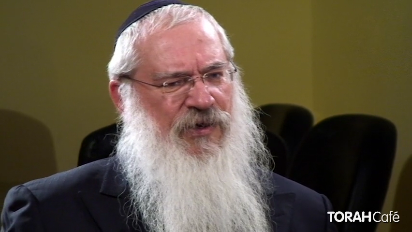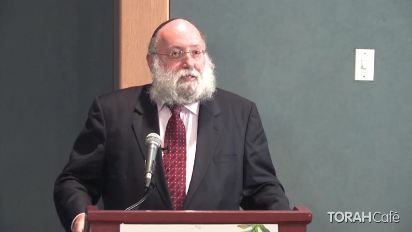-
The Unanswered Questions (2:34)
This thought provoking discussion by Rabbi Simon Jacobson brings up a fascinating point about the four questions asked at the seder: We don’t provide an answer to two of the four questions! Rabbi Jacobson offers a novel idea as to why this might be so.
Rabbi Simon Jacobson (149)
-
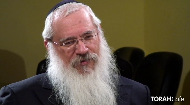 3:15
3:15
Are Matzah and Maror Related? (3:15)
Rabbi Manis Friedman (248)
-
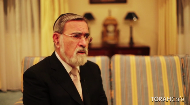 3:54
3:54
The Odd Seder Invitation (3:54)
3 minutes of inspiration. When does the "Bread of Affliction" become the "Bread of Freedom"? Rabbi Jonathan Sacks OB"M gives a eye opening explanation for the opening invitation to the Seder.
Rabbi Lord Jonathan Sacks (113)
-
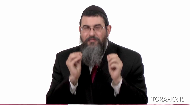 2:39
2:39
Hallel - Songs of Praise (2:39)
We're coming down the home stretch, so what are these pages of Psalms for? Rabbi Yossi Paltiel reminisces about his childhood experiences at this part of the seder. Hallel celebrates the personal, family and communal redemptions that we are waiting for.
Series: Haggadah Insights
Rabbi Yossi Paltiel (56)
-
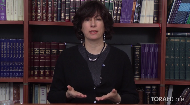 5:58
5:58
Belts, Shoes and Sticks: What You Need at Your Seder (5:58)
The belt holds onto the hips, the shoes support our lowest level and the stick tames the wild beast. Mrs. Shimona Tzukernik gives an amazing, mystical take on the seder and our redemption. This video will change your vision of the exodus from Egypt. You can visit Mrs. Tzukernik's website at: thekabbalahcoach.com.
Mrs. Shimona Tzukernik (121)
-
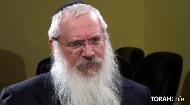 5:21
5:21
The Definition of Slavery (5:21)
Rabbi Manis Friedman presents unique insights into the Passover Haggadah. On Passover we speak a lot about freedom, and breaking free from slavery. But do we really know the definiton of slavery? In this fascinating clip, Rabbi Manis Friedman provides viewers with the definition of slavery as well as tips on how to break free. .
Rabbi Manis Friedman (248)
-
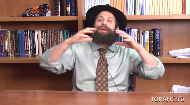 4:37
4:37
Passover: My God, My Mother (4:37)
Rabbi Dov Yona Korn (4)
-
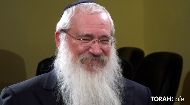 7:12
7:12
The Kabbalah of Pharaoh (7:12)
Rabbi Manis Friedman (248)
-
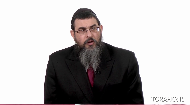 5:31
5:31
Kadesh - Making Kiddush (5:31)
Saying Kiddush on Passover, we create the holy energy which allows us to achieve personal freedom. Rabbi Yossi Paltiel outlines the beginning of the seder and the meaning of a holiday.
Series: Haggadah Insights
Rabbi Yossi Paltiel (56)
-
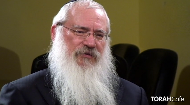 2:18
2:18
G-d is in the Details (2:18)
Rabbi Manis Friedman (248)
-
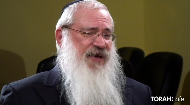 5:25
5:25
True Freedom (5:25)
The Exodus from Egypt took place over 3000 years ago- why are we still celebrating that freedom today? Rabbi Manis Friedman has the answer.
Rabbi Manis Friedman (248)
-
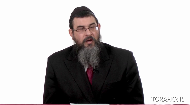 3:12
3:12
Tzafon - The Afikoman (3:12)
The Afikomen is the uncovering of the hidden, representing the rewards to come in the future. Rabbi Yossi Paltiel describes the procedure with the afikomen and the spiritual background behind it.
Series: Haggadah Insights
Rabbi Yossi Paltiel (56)
-
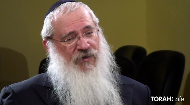 2:55
2:55
Approaching a Rebel (2:55)
In the Passover Haggadah we have an example of a Jewish rebel- a Jew who wants to exclude himself from the Jewish Nation and not be part of "the people". How do we respond to such a person? Rabbi Manis Friedman has the answer in this short, insightful clip into a character of the Passover Haggadah.
Rabbi Manis Friedman (248)
-
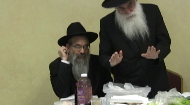 1:32:16
1:32:16
How to Conduct a Seder (Chabad Custom) (1:32:16)
Rabbi Berel Bell (151)
-
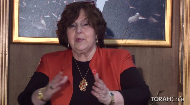 9:24
9:24
Cleaning Out Our Streimel (9:24)
Leave your ego behind and enjoy Pesach. Mrs. Miryam Swerdlov expresses her own joy at the freedom celebrated by Pesach and includes a story that encourages us to clean out our inner chometz.
Mrs. Miriam Swerdlov (7)
-
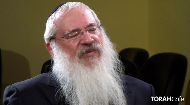 7:30
7:30
Passover: The Four Questions (7:30)
Rabbi Manis Friedman (248)
-
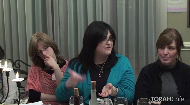 4:02
4:02
The Seder Plate: Charoses (4:02)
Mrs. Eidle Sputz (3)
-
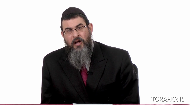 2:52
2:52
Beirach - Grace After the Meal (2:52)
Blessings after meals are a part of everyday life, why is this night different? Rabbi Yossi Paltiel introduces the 3rd cup and brings in the spiritual aspects of grace after meals, thanking G-d for the ordinary things in our lives.
Series: Haggadah Insights
Rabbi Yossi Paltiel (56)
-
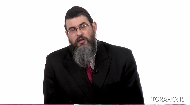 3:28
3:28
Urechatz - Washing Hands (3:28)
If you are going to do it, do it right. Rabbi Yossi Paltiel explains why we are washing our hands before eating a vegetable, with a brief story to illustrate his point.
Series: Haggadah Insights
Rabbi Yossi Paltiel (56)
-
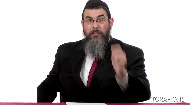 2:40
2:40
Nirtza - Next Year in Jerusalem (2:40)
How have we made G-d happy by completing the seder? Rabbi Yossi Paltiel completes his commentary on the seder with the 4th cup and the hope you were able to enjoy your seder with family and friends, contemplating and talking about the story and the meanings behind it.
Series: Haggadah Insights
Rabbi Yossi Paltiel (56)
-
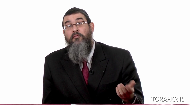 4:58
4:58
Korech - The Sandwich (4:58)
There is more enjoyment in freedom with an appreciation for the bitterness underneath. Rabbi Yossi Paltiel begins with a description of the korech procedure and then gives an interesting comparison to kreplach.
Series: Haggadah Insights
Rabbi Yossi Paltiel (56)
-
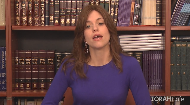 8:12
8:12
Korech: The Significance of the Sandwich (8:12)
We are all one, despite our differences, our inner spiritual levels and our distinct personalities. Why do we eat the tasteless matzah together with the bitter herbs and attribute it to Hillel? Mrs. Gitty Rapoport begins with a description of the procedure of Korech and goes on to explanation behind it. .
Mrs. Gitty Rapoport (4)
-
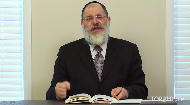 7:19
7:19
Addressing the Four Sons (7:19)
Look around at the people gathered around your seder table and address each one on their own level. Rabbi Nochem Kaplan describes the four sons and their blessings and needs.
Rabbi Nochum Kaplan (12)
-
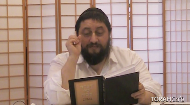 15:15
15:15
This Poor Bread - Hei Lachma Anya (15:15)
Rabbi Eli Silberstein (139)
-
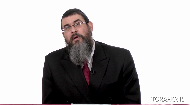 4:38
4:38
Maror - Bitter Herbs (4:38)
The world and our history have been full of bitterness, maror helps us remember it. Rabbi Yossi Paltiel includes the chassidic interpretation of the value of bitterness, turning it into a challenge to be overcome, as if bringing us out of slavery.
Series: Haggadah Insights
Rabbi Yossi Paltiel (56)
-
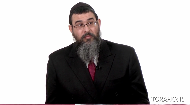 3:11
3:11
Karpas - Dipping in Salt Water (3:11)
That little bit of vegetable has a big responsibility. Rabbi Yossi Paltiel emphasizes the role of the children and their questions, and aren't we all children?.
Series: Haggadah Insights
Rabbi Yossi Paltiel (56)
-
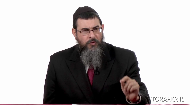 4:36
4:36
Motzi Matzah - Matzah (4:36)
Some mitzvahs are expensive and yet they connect us to G-d. Celebrate! Rabbi Yossi Paltiel gives directions for this important part of the seder., in addition he shares chassidic insights into the calculations behind the meaning of the words.
Series: Haggadah Insights
Rabbi Yossi Paltiel (56)
-
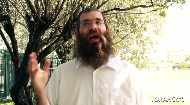 8:40
8:40
Matzah: A Lesson In Humility (8:40)
This fantastic new edition of the 'Elevate Series' explores the deeper meaning of yet another holiday - Passover. The film is orated by three Shluchim and educators from South Florida: Rabbi Velvel Lipsker - Mashpia in Rabbinical College of Greater Miami. Rabbi Yossi Srugo - Mohel. Rabbi Yakov Garfinkel - Program Director of Lubavitch Educational Center.
Rabbi Velvel Lipsker (5)
-
 5:58
5:58
Passover: It's all for the Kids (5:58)
To purchase the Slager Haggadah, authored by Rabbi Miller and published by Kol Menachem, click here.
Rabbi Chaim Miller (49)
-
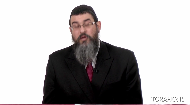 3:09
3:09
Magid - Retelling the Story (3:09)
Magid is the question and answer session and children always deserve straightforward answers. Rabbi Yossi Paltiel emphasizes the importance of engaging the children in the seder and maintaining the joy of the holiday.
Series: Haggadah Insights
Rabbi Yossi Paltiel (56)
-
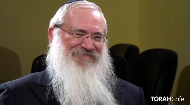 3:02
3:02
Individuality (3:02)
Rabbi Manis Friedman (248)
-
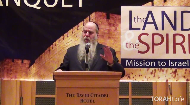 15:50
15:50
No Jewish Child Left Behind (15:50)
Series: Mission to Israel 2012
Rabbi Moshe Kotlarsky (22)
-
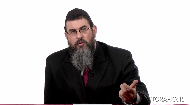 1:07
1:07
Rochtzo - Washing Hands (1:07)
Now we wash our hands to bring holiness into ordinary food. Rabbi Yossi Paltiel gives a quick review of how to proceed.
Series: Haggadah Insights
Rabbi Yossi Paltiel (56)
-
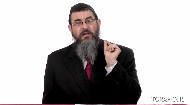 8:47
8:47
Yachatz - Break the Matzah (8:47)
When is broken better than whole and what does it remind us of? Rabbi Yossi Paltiel explains the process and reasons for this part of the seder and illustrates the role of the broken matzah with a special story.
Series: Haggadah Insights
Rabbi Yossi Paltiel (56)
-
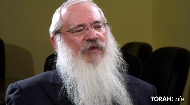 1:21
1:21
The Contemporary Meaning of the Seder (1:21)
Rabbi Manis Friedman (248)
-
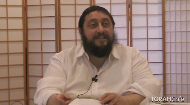 5:35
5:35
Ma Nishtana (The Four Questions) (5:35)
Ma Nishtana is perhaps the most well known parts of the seder. But dids you ever wonder why we ask questions on Passover? Why not ask questions on other Jewish holidays? In this segment, Rabbi Eli Silberstein will answer these questions and perhaps the most important question, "Why is this night different from all other nights?".
Rabbi Eli Silberstein (139)
-
 2:55
2:55
The Kabbalah of Jewish Food: Matzah (2:55)
Mrs. Rochel Kaplan (3)
-
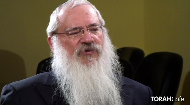 3:59
3:59
The Significance of the Seder (3:59)
Rabbi Manis Friedman (248)
-
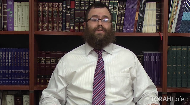 4:40
4:40
Passover: Think Different (4:40)
Rabbi Chaim Miller is the author of the Slager Haggadah published by Kol Menachem, New York. To purchase his Hagaddah, click here.
Rabbi Chaim Miller (49)
-
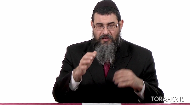 3:36
3:36
The Kabbalah of the Seder Plate (3:36)
Rabbi Yossi Paltiel (56)
-
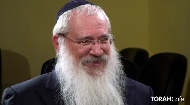 4:14
4:14
Religious Symbols (4:14)
Rabbi Manis Friedman (248)
-
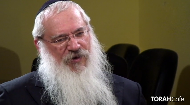 4:03
4:03
The Torah as a Constant (4:03)
Rabbi Manis Friedman (248)
-
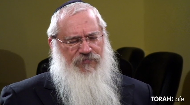 1:43
1:43
Why We Celebrate Exodus (1:43)
Rabbi Manis Friedman (248)
-
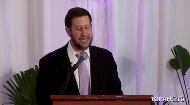 1:46
1:46
The Binding of Isaac and the Redemption from Egypt (1:46)
Rabbi Yitzchak Schochet (186)
-
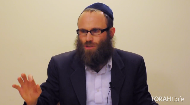 4:24
4:24
Yachatz: There Are Two Sides to Every Matzah (4:24)
How can one matzah symbolize poverty and extravagance? Rabbi Dovid Birk demonstrates the division of the middle matzah. The smaller side is the bread of poverty that we say the whole haggadah over, the larger side symbolizes the wealth that allows for dessert and finally redemption.
Rabbi Dovid Birk (4)
-
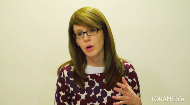 3:52
3:52
Of Course You Should Ask (3:52)
The questioning children are the highlight of the seder. Mrs. Miri Birk speaks about the focus on the child in each of us. In Egypt we were slaves; our voices were not heard. Only free people have the option of questioning. Jews today still have questions but next year in Jerusalem all our questions will be answered.
Mrs. Miri Birk (1)
-
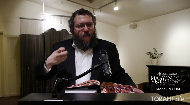 1:25:46
1:25:46
Pesach: Making It Personal (1:25:46)
This class was given March 18, 2013 - 7 Nissan, 5773 (Parshat Tzav).
Rabbi Reuven Wolf (14)
-
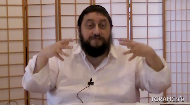 10:21
10:21
The Sequence of the Festive Meal (10:21)
The order of the Passover Seder is very specific. Not only is there a particular sequence in which each part is performed, but we even announce that sequence at the beginning of the meal in the classic song, "Kadeish, Urchatz..
Rabbi Eli Silberstein (139)
-
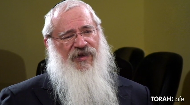 0:57
0:57
The Journey Out of Egypt (0:57)
Rabbi Manis Friedman (248)
-
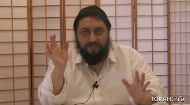 10:35
10:35
Haggadah: The Four Sons (10:35)
Every year during the seder we read about the infamous four sons - the wise, the wicked, the simple and the one who does not know how to ask. However, upon closer examination, it appears that the wise and the wicked sons - seemingly polar opposites - seem to be asking the same question
Rabbi Eli Silberstein (139)
-
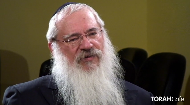 1:16
1:16
Why Questions? (1:16)
Rabbi Manis Friedman (248)
-
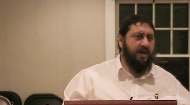 11:35
11:35
What If You Find Leaven During Passover? (11:35)
Rabbi Eli Silberstein (139)
-
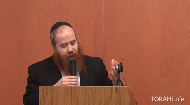 2:48
2:48
Freedom to Ask Questions (2:48)
Rabbi Kasriel Shemtov (5)
-
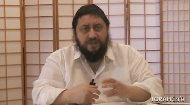 15:50
15:50
The Commandment to Remember the Exodus (15:50)
During the Passover Seder we read about the commandment to mention the Exodus from Egypt
Rabbi Eli Silberstein (139)
-
 6:01
6:01
The Theme of Passover (6:01)
Rabbi Yossi Paltiel (56)
-
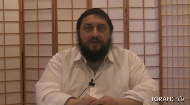 8:22
8:22
Not by an Angel, Not by a Messenger (8:22)
Rabbi Eli Silberstein shares a deep insight by Rabbi Akivah Eiger, one of the most studied Torah giants of the 17th century, regarding a seeming contradiction in the texts relating the story of the tenth plague, the death of the first born. This fascinating idea proves relevant with regard to the mitzva we still practice today -- the redemption of the firstborn known as pidyon haben.
Rabbi Eli Silberstein (139)
-
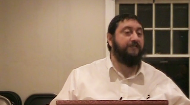 3:52
3:52
Destroying Leaven (3:52)
Rabbi Eli Silberstein (139)
-
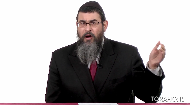 6:20
6:20
Why is it called "The Seder"? (6:20)
“Seder” means “order”, and “Pesach” means to “jump over” which connotes a lack of order. How do we reconcile this contradiction?.
Rabbi Yossi Paltiel (56)
-
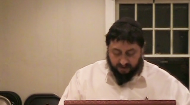 12:03
12:03
When Do We Search For Leaven (12:03)
Rabbi Eli Silberstein (139)
-
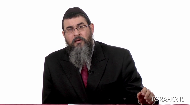 2:47
2:47
Shulchan Orech - Festive Meal (2:47)
We finally get to eat, but is there room? It is holy to enjoy the meal, but remember more matzah is coming. Rabbi Yossi Paltiel describes what is required for the meal, and exhorts us to enjoy.
Series: Haggadah Insights
Rabbi Yossi Paltiel (56)
-
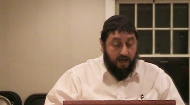 6:28
6:28
When Don't We Search For Leaven (6:28)
Rabbi Eli Silberstein (139)
-
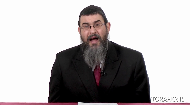 3:27
3:27
Bread of Affliction (3:27)
Rabbi Yossi Paltiel (56)
-
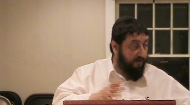 7:18
7:18
Where Do We Search For Leaven (7:18)
Rabbi Eli Silberstein (139)
-
 5:18
5:18
Searching For Leaven (5:18)
Rabbi Eli Silberstein (139)
-
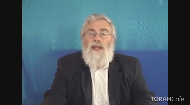 6:36
6:36
Don't "Passover" the Children (6:36)
The Seder night should be made about the children, incorporate them into festivities and encourage them to answer questions.
Rabbi Abba Perelmuter (63)
-
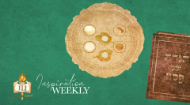 1:47
1:47
Confused About Passover? (1:47)
Feeling lost at the Seder is a Passover tradition.
Series: Inspiration Weekly


